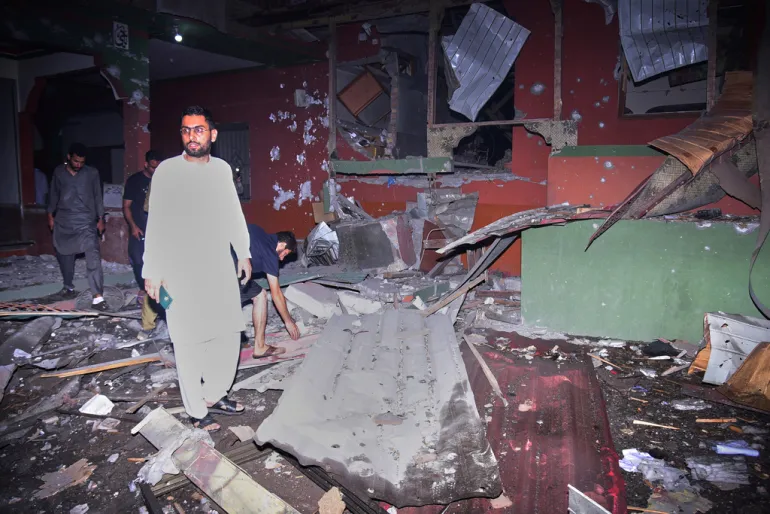In a military operation dubbed “Operation Sindoor,” India has struck nine sites in Pakistan and Pakistan-administered Kashmir, after which Islamabad said that it had retaliated by striking Indian military targets, including downing several warplanes.
Pakistan’s military disclosed that at least 26 people were killed in the Indian attacks and firing along the border. India said at least eight were killed by Pakistani shelling.
The Indian strike and counterattack by Pakistan come amid soaring tensions between the two nuclear-armed neighbours, after a deadly attack last month on tourists in Indian-administered Kashmir that New Delhi blamed on Islamabad, which denied any involvement.
India’s government said in a statement that its military had attacked “terrorist infrastructure in Pakistan and Pakistan-occupied Jammu and Kashmir from where terrorist attacks against India have been planned and directed.”
“Our actions have been focused, measured and non-escalatory in nature. No Pakistani military facilities have been targeted. India has demonstrated considerable restraint in selection of targets and method of execution.”
India’s government
The missiles struck locations in Pakistan-administered Kashmir and the country’s eastern Punjab province.
Indian Foreign Secretary, Vikram Misri accused Pakistan of failing to act against “terrorist infrastructure” on its soil following the April 22 attack in Indian-administered Kashmir.

“Instead, all it has indulged in is denial and allegations. Pakistan also has a well-deserved reputation as a haven for terrorists around the world.”
Vikram Misri
Misri noted that intelligence indicated that “further attacks were impending” against India. “There was thus the compulsion both to deter and to preempt,” Misri told a news conference in New Delhi.
Calls For Restraint
UN Secretary-General, Antonio Guterres called for maximum military restraint from both sides.
His Spokesperson said that the Secretary-General is “very concerned” about the Indian military operations across the Line of Control and international border.
The spokesperson added that the world cannot afford a military confrontation between India and Pakistan.
Also, US President, Donald Trump said that the clashes were “a shame.” Trump said at the White House, “I just hope it ends very quickly.”
Additionally, China called India’s attacks on Pakistan and Pakistan-administered Kashmir “regrettable” while urging both sides to exercise restraint.
A spokesperson for China’s Ministry of Foreign Affairs said in a statement that China is concerned about the ongoing situation.
“India and Pakistan are and will always be each other’s neighbours. They’re both China’s neighbours as well. China opposes all forms of terrorism.
“We urge both sides to act in the larger interest of peace and stability, remain calm, exercise restraint and refrain from taking actions that may further complicate the situation.”
China’s Ministry of Foreign Affairs
The foreign ministry of the United Arab Emirates also urged restraint on both sides.
Meanwhile, Nitasha Kaul, Director of the Centre for the Study of Democracy, opined that the strikes are “very concerning.”
“Once again, the worst affected are going to be the people in the region, the Kashmiris, who are caught between the competing and proprietorial and rival postures and attitudes of India and Pakistan.”
Nitasha Kaul
Still, she said, that the escalation is “not that surprising, because within India … there has been a domestic pressure building up for a more militarist response, given the fact that there is a particularly hyper-nationalist government in power.”
“In that sense, sadly, this was a countdown to a greater escalation, and hopefully it won’t proceed much further beyond what has already happened with these strikes.”
Nitasha Kaul
What makes this latest escalation particularly troubling is not just the military exchange, but the sheer predictability of it.
A terror attack, a cross-border strike, a retaliatory bombardment—each side citing sovereignty and security, each side claiming the moral high ground. It’s a cycle we’ve seen too many times before.
The real danger is not just in the missiles fired or the rhetoric exchanged, but in the growing public acceptance of military response as the default diplomatic language.
As long as dialogue remains hostage to nationalism and mutual suspicion, the subcontinent will remain perched on the edge of catastrophe.
For the sake of regional peace and global stability, India and Pakistan must do more than react.
READ ALSO: Ghana’s GDP Growth Lacks Environmental Sustainability, IMANI Warns






















